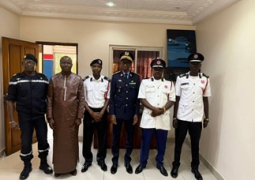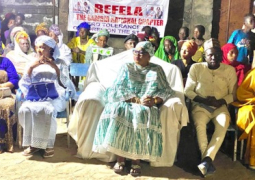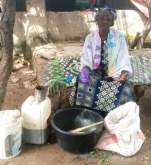
The ‘Nafa’ Program component of The Gambia Social Safety Net Project (SSNP), is a US$ 31 million project, jointly funded by the World Bank and the Government of The Gambia. The programme is designed to promote continuity and harmonisation with other programs, by expanding an existing package of cash transfers with Social and Behavioural Change Communication (SBCC) managed by NaNA and partners.
The National Nutrition Agency (NaNA), Directorate of Social Welfare and Department of Community Development are the implementing partners of this programme. The Gambia SSNP is being implemented in the West Coast (WCR), Central River (CRR), North Bank (NBR), Lower River (LRR) and Upper River Regions (URR), targeting 15,606 extremely poor households.
This equates to approximately 40 percent of the extremely poor households in The Gambia. For a start, it was piloted in Foni Bintang, Nianija and Wuli West Districts.
The Project Development Objective (PDO) is to improve the coordination of social assistance activities, provide temporary social assistance support to rural households in the wake of COVID-19, and increase inclusion of the extreme poor in the ‘Nafa’ Program.
The beneficiary selection was done using a Proxy-Means Test (PMT), which was followed by a community validation exercise in the 20 poorest districts of The Gambia. The regular revenue provided to extreme poor households is aimed at increasing both short-term consumption of essential goods, and enabling longer-term investments in human and productive capital.
Tailored SBCC provides information to beneficiaries and non-beneficiaries to encourage investments that can bolster human capital especially maternal and child health and nutrition, adolescence education and family planning; parenting and prevention of gender-based violence; and productive capital especially savings, entrepreneurship and agriculture to break the inter-generational cycle of poverty.
In the three piloted districts, a total of Two Thousand, Seven Hundred and Seventy (2,770) beneficiary households each received D3000 every two months during the seven rounds of payment.
Recounting the challenges and everyday struggles that she, like others encounter, Marena indicated that life was challenging for her and her household before the commencement of the ‘Nafa’ Program because they are poor.
However, after benefiting from the Cash Transfer, Marena said she used part of her money to buy the materials she used to start the soap making after buying a bag of rice and basic food commodities for her household.
“A lot of people from the community now buy soap from me because of its quality,” she said, adding that she is able to make profit after every product as well as reinvest in her business.
She stated that, with women as the primary caregivers of households, it is important that make best use of the ‘Nafa’ Cash Transfer by investing part of it to ensure they are able to sustain their households when the project phases out.
According to her, most beneficiaries lack creative ideas but after being trained on SBCC and attending several sessions before any cash transfer by the project, they had ideas to invest part of their ‘Nafa’ cash to ensure they are able to sustain their households when the project phases out
She thus thanked the World Bank and The Gambia Government for funding the project. He also thanked implementing partners.
Samba Bah, Governor of Upper River Region, expressed satisfaction with the way the Cash Transfer was being carried out by implementing partners, saying this is because an assessment was done to identify extremely poor households.
He observed that the Cash Transfer has positively impacted the lives and livelihoods of beneficiaries.
He pointed out that beneficiaries do not only stop at receiving the money but are putting it into good use with some of them investing in businesses and other ventures.
The project, Governor Bah noted, has transformed the lives of many in his region and other parts of the country and therefore appeal to the World Bank and The Gambia Government to expand the project to other districts across the country and increase the duration and scope of the project so that the poverty alleviation the country yearns for is achieved.
Abdou Aziz Ceesay, Director of Social and Behavioral Change Communication at the National Nutrition Agency, said as a nutrition agency responsible for all nutrition and nutrition-related activities in the country, the success registered by the project is a dream come true for them.
Ceesay highlighted that if ‘you uplift the extremely poor from poverty’ it improves under-nutrition, adding that lifting households from poverty and building their resilience improve their health and nutritional status as well.
Mr. Ceesay pointed out that if the trend of success registered by beneficiaries continues, we will drastically reduce malnutrition and contribute to socio-economic development of the country.
He said, the reason why the cash transfer is accompanied with Social and Behavioral Change Communication, is to ensure beneficiaries invest part of the money they receive to ensure they are able to sustain themselves at the end of the project.
He called on other beneficiaries to emulate those who are already successful or have started micro-finance businesses.
“If some beneficiaries can do it, I believe any other beneficiary from any district can do the same thing or even better,” Director Ceesay expounded that the monies being given are not the ends and means of everything.
Director Ceesay added his Project Coordinator and team have started discussions with the World Bank and The Gambia Government about the possibility to increase the coverage, resource envelope, duration and scope of the project.
According to him, in The Gambia almost everybody is poor, it is just that our level of poverty differs.
He therefore appealed to funders to extend the project to other districts across the country and increase its duration to possibly 36 months.
He also appealed to the UN System, European Union and other donor agencies to support The Gambia Government in trying to increase the number of beneficiaries supported by the Cash Transfer.
He said the intervention would have a direct impact on households in the country and thereby improve the health and nutrition of the population.
“No Social Safety Net or Social Assistance activity will last forever and I therefore appeal to beneficiaries to use the opportunity to increase their revenue base and get into other micro-finance activities to support their households so that when the project phases out they can turn around and get money from other avenues to support their households.” he concluded.
Read Other Articles In National News
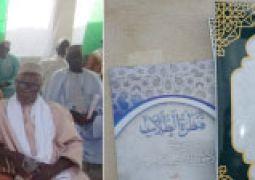
2 Books authored by late eminent scholar Sheikh Alieu Badara Faye launched
Jan 6, 2025, 11:18 AM
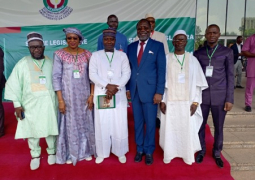
Gambian delegation takes oath as ECOWAS Parliament inaugurates 6th legislature
Apr 8, 2024, 11:36 AM
